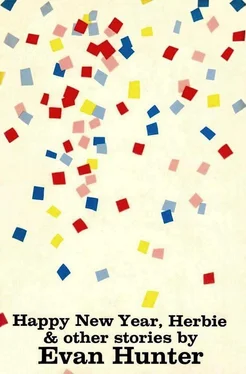It was, in fact, impossible to imagine Jason in any conceivable world outside North Brother Island. The concept of him leaving the island to enter a city full of people earning their daily bread was almost laughable, and yet he did it every weekday morning, and with an earnestness that bordered on fanaticism. It was Jason who once leaped over the metal railing onto the deck of the ferry as it pulled away from the island. It was Jason who, on another morning, ran down to the dock in his pajamas, his working clothes slung over his arm, and then washed and dressed in the men’s room before the boat reached the mainland. It was Jason who knew everyone on the island by his first name, Jason who first suggested we play hide-and-seek one night, Jason who discovered and used the outdoor barbecue near the teahouse looking out at Hell’s Gate.
I had seen Jason often on the ferry while we were still living in McCloskey Hall. He was a tall, strikingly handsome man with black hair and blue eyes that seemed always smiling. His closest friend was a fellow named Norman who lived on the third floor of Finley Hall, a tall blond man with an excellent build and the same laughing look in his gray eyes. They would walk onto the ferry together, talking and joking, and then would go to sit in the bow of the boat where they were immediately surrounded by a half-dozen people who seemed to be having the time of their lives each morning. Sitting on the bench with an open book in my lap, hearing the sounds of laughter from the bow, I felt the unconscious pang of the outsider and longed for a moment to be a part of such obvious good fellowship.
I did not become a part of it until late August, when we had already moved into Finley Hall and were awaiting the birth of the baby. The first hurricane of the year came about three days before Joan expected to go to the hospital. I had been a New Yorker all my life and was used to the hurricane season, but I had never lived through a hurricane on an island in the middle of the East River with my wife momentarily expecting a baby. There was a cyclone fence around the entire island, and the water rose above that until the fence was no longer visible, and then the water covered the outdoor wash lines, and then it flooded into Finley Hall and began rising in the basement of the building. The radio was warning all residents of the city to tape windows and lash down anything that might be blown away, and the Coast Guard advised all residents of North Brother that it was standing by to take people to the mainland. The big question for everyone living in Finley, considering the fact that this was only the prelude to the storm, with the worst expected later in the afternoon, was whether or not to leave with the Coast Guard. The question was enormously magnified for me because I had visions of Joan suddenly going into labor at the height of the storm. We were debating whether or not to accept the Coast Guard’s offer when we suddenly heard a drum beating somewhere in the building. We both went into the hall.
Jason was standing on the ground-floor landing, the water already up to his knees. He was wearing a yellow rubber rain cape and sou’wester, and he was beating a huge drum and shouting, “Hear ye, hear ye,” while Norman read off a proclamation. The proclamation stated that the residents of Finley Hall refused to be intimidated by the elements but instead chose to defend their homes in the teeth of the storm. It went on to imply strongly that anyone who left the building was, in effect, a rat deserting the sinking ship. There was, I must admit, an element of adventure to what Jason proposed. He wanted every able-bodied man to come immediately to the ground floor, where the furniture of the occupants there would be moved to a higher level just in case the water continued to rise. He then wanted a task force to go through the entire building, taping windows, making sure that cribs were protected from possible shattering glass, seeing that flashlights and kerosene lamps were available to each and every person who chose to remain.
I turned to Joan. “What do you think?” I asked.
There was a worried look on Joan’s face. I now realize she was scared to death of having her first baby, terrified by the prospect of not being able to reach the hospital should she go into labor. I mistook her fear for the indecision of a nineteen-year-old. She turned to me; she turned to the strong guidance of her twenty-one-year-old husband. “Whatever you think,” she said.
“Well, how do you feel?”
“I feel all right.”
“Then let’s stay, okay?”
Joan nodded doubtfully. “Okay,” she said.
Under the leadership of Jason, we worked tirelessly all that afternoon, moving furniture, taping windows, and then sitting through the silence that came with the eye of the storm. The funny part was that the storm dissipated entirely. We were all awaiting the onslaught with a cheerful adventurousness that belied the actual danger. Looking from the fourth-floor window, it was impossible to tell where the island ended and the river began. Finley Hall rose like a tall white finger out of the waves, its basement and ground floor already flooded, the water halfway up the steps to the first floor. We had worked hard, and afterward Jason rewarded us with drinks in his apartment while we waited for the real storm to strike.
Instead, it blew out to sea.
I can still remember the slightly embarrassed faces of the people who had left the island and who returned the next morning, carrying their precious belongings. By then, I felt I was becoming one of Jason’s friends, and I was able to share his laughter and his pointed gibes. The next day I took Joan to the hospital and Timmy was born.
I don’t know how other people feel when they are presented with their first son. I now have three sons, and Timmy is almost thirteen years old, but I was twenty-one when he was born and a senior in college, and my pride at the time was mixed with a sense of unreality. I was a father; I could look through the plate-glass window at the hospital and see the red-faced infant they said was mine, but I honestly did not feel like a father. I felt instead as though I were only going through the time-honored motions of passing out cigars, of inviting Jason and Norman in for drinks, in an attempt to convince myself — without real conviction — that I was honestly a father. Jason, on the other hand, was my idea of what a parent should be. He was, after all, the father of three children, and yet he had never lost his youthfulness or his joy for living. I would watch him running through the hallway with his two eldest, firing toy guns at them, entering their world wholeheartedly, falling dead over the banister when one of his sons fired an imaginary bullet. I would watch him parading around the island with his infant daughter perched on his shoulders, pointing out the boats on the river, or the sunset, talking to her in a childish prattle that I’m sure to this day she understood. It seemed to me that this was the sort of relationship I wanted with my son. It seemed to me that Jason had managed to hang onto a marvelous capacity for finding fun in everything, and I was determined to follow his good example.
In October we had our Peeping Tom. In the middle of the night we heard a scream from the other end of the hallway, and then Jason was yelling something, and I leaped out of bed and ran to the door. Jason and Mary were already in the hallway, and Norman was running up from the third floor in his pajamas, shouting, “Jason? What is it? What’s the matter?” Mary was wearing a baby-doll nightgown and no robe, but there was nothing provocative about her as she stood in the hallway behind Jason; she looked instead like a twelve-year-old who had been startled out of sleep by a bad dream. The dream, it seemed, was real enough. She had been nursing her daughter when she chanced to look up at the window and saw a man’s face looking in at her. She had screamed and then covered her breast, and Jason had begun shouting at the man, and here we were now, standing in the chilly hallway in our pajamas, confronted with what looked like a very serious situation. We all knew there were unmarried students on the island, and it seemed to us now that one of them was possibly a pervert. It was four o’clock in the morning, and time for Timmy’s bottle, so we all went into our apartment and Joan made some coffee while I warmed the bottle, and then while I fed Timmy we discussed what we were going to do about our Peeping Tom.
Читать дальше












